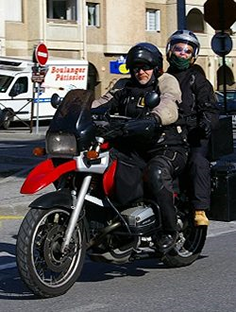 The Federation of European Motorcyclists Associations (FEMA) have published an interview with Malcolm Harbour UK MEP, Chair of Internal Market and Consumer Protection (IMCO) committee and shadow Rapporteur who is considering amendments to the European Commissions proposal on Approval and market surveillance of two – or three-wheel vehicles and quadricycles.
The Federation of European Motorcyclists Associations (FEMA) have published an interview with Malcolm Harbour UK MEP, Chair of Internal Market and Consumer Protection (IMCO) committee and shadow Rapporteur who is considering amendments to the European Commissions proposal on Approval and market surveillance of two – or three-wheel vehicles and quadricycles.
At Right To Ride we have brought you clear and concise reports on the European Commission proposal, explaining exactly what is not in the proposal that riders, particularly in the UK and Ireland, have been protesting about recently.
As one rider commented on Right To Ride, “You have made it perfectly clear that there is a list of falsehoods masquerading as facts (…), you can state it over and over again for the benefit of all that these are untruths doing the rounds of the biker networks and social media, you can write it in Dayglo and slap an anti-tampering notice on it, but the message won’t sink in.”
Interview
Malcolm Harbour comments at the start of the interview with FEMA, “There is significant hysteria surrounding the review of this Regulation and clearly I don’t support the petition (this is a petition by the UKIP MEP Marta Andreasen). This is the result of political opportunism playing up rider concerns with the EU lawmaking process. The EU already regulates the type approval of motorbikes and a periodical review of the rules such as this is hardly a surprise.
The exercise underway is principally about updating the type approval process for powered two wheelers to reflect the introduction of new technologies. The modified legislation will also ensure that motorbikes are safer for the public, cleaner and quieter while supporting EU industry competitiveness. The modernised Regulation aims to achieve this.
Specifically, a number of criticisms on the Regulation are simply not relevant to our work, for example high visibility jackets for riders, the banning of older motorcycles from urban areas, or the legitimacy of EU funded research on throttle and speed control. These are all issues which are entirely outside the subject matter of this particular legislative proposal.”
Malcolm Harbour clarifies the issues and gives fresh information on anti-tampering, “So let’s be quite clear about this: drive train improvements or part replacements using aftermarket parts will continue to be allowed. In fact, I can tell you that amongst the MEPs most closely involved on the file, we are already agreed on deleting the bulk of Article 18 on anti-tampering.”
Problematic Amendments
“Of the problematic amendments tabled to the Committee report, a number have already been withdrawn, and for those which have not, they do not have majority support and I am trying to persuade colleagues to withdraw them in the run up to the vote. If they happen to survive the vote, which I very much doubt, the Council of Ministers will certainly reject them anyway.”
Commenting on the scope of the anti-tampering measures, Malcolm Harbour explains “This uncertainty is compounded by the fact that the concrete measures to prevent modifications of the powertrain are still unknown because the Commission suggests developing them via delegated acts. In any case, the European Parliament retains a right of scrutiny over any such future measures, so it is absolutely not the case that the Commission would be able to design these technical specifications behind closed doors”.
At Right To Ride, we highlighted this in our response to the DfT consultation, that we have major concerns due to where the proposal sits at present within the legislative process. It is our understanding that the proposal is scheduled to be voted on before the regulations, delegated acts and the adoption of harmonised international standards, have been agreed on.
We explained in our response that all these issues need to be formulated before any agreement or alignment within the Council of Ministers and before any vote within the EU parliament takes place regarding the Commission’s proposal and subsequent amendments put forward by the IMCO committee. Failure to do so would create an impossible situation whereby the motorcycle industry, consumers and member state governments are not able to have a clear understanding of what the simplification of this regulation actually entails.
Anti-tampering – Modifications
Regarding drive train improvements or part replacements using aftermarket parts, Malcolm Harbour commented, ” So let’s be quite clear about this: drive train improvements or part replacements using aftermarket parts will continue to be allowed. In fact, I can tell you that amongst the MEPs most closely involved on the file, we are already agreed on deleting the bulk of Article 18 on anti-tampering.”
Also with regards to amendments that call for any modifications to the motorcycle to be checked by a competent authority, or setting up national agencies to inspect emissions, Malcolm Harbour says, “I really think these ideas will not meet with majority support, neither in the European Parliament, and definitely not in the Council of Ministers.”
Although the amendments will be voted on at the IMCO meeting on the 22nd November, as yet we do not know what has already been deleted, what the compromises will be, nor what the final report which will voted on in Parliament will contain.
We hope that this interview will bring a halt to the “Silly Season”, end the scaremongering and the woes of the soothsayers, that this will bring the end to motorcycling, so that we can focus on the real issues.
Read the full interview with Malcolm Harbour MEP on Right To Ride EU – Click Here


